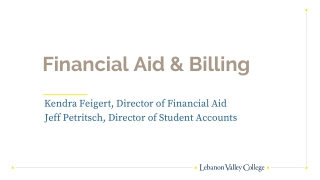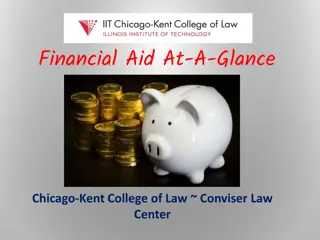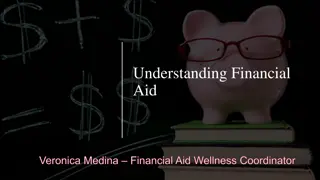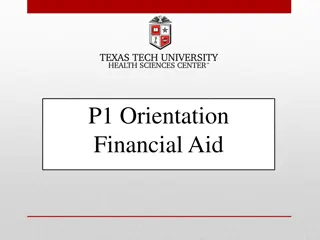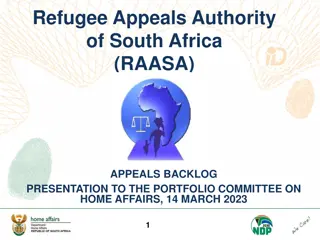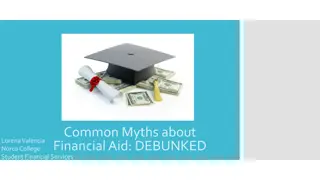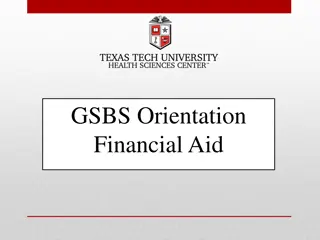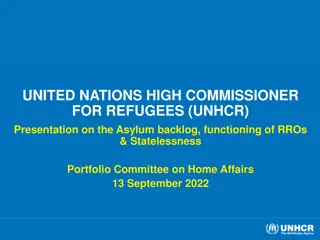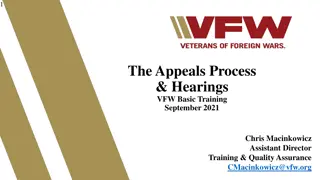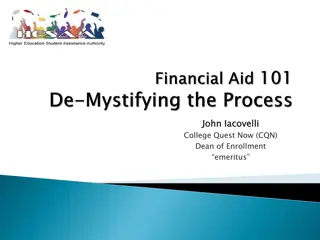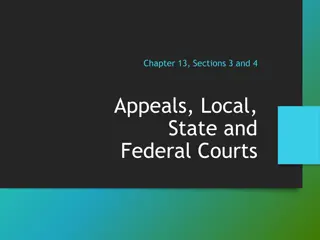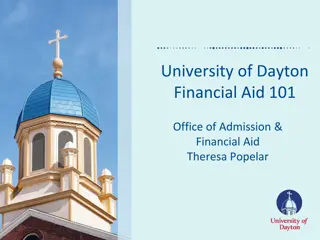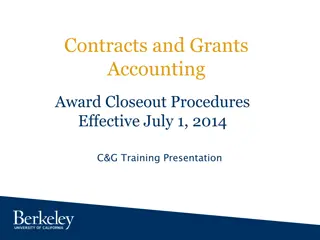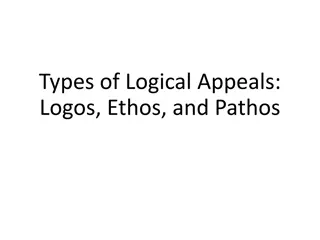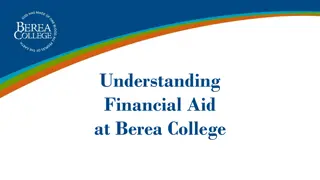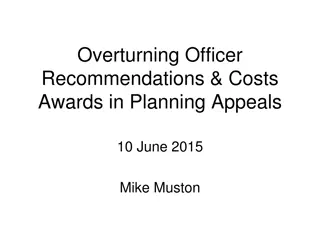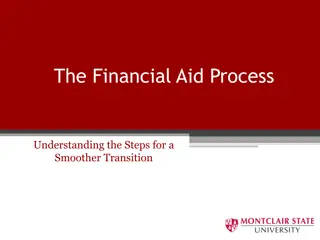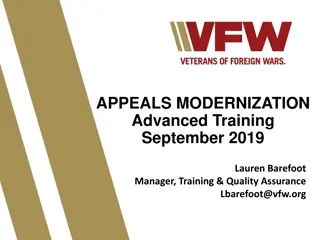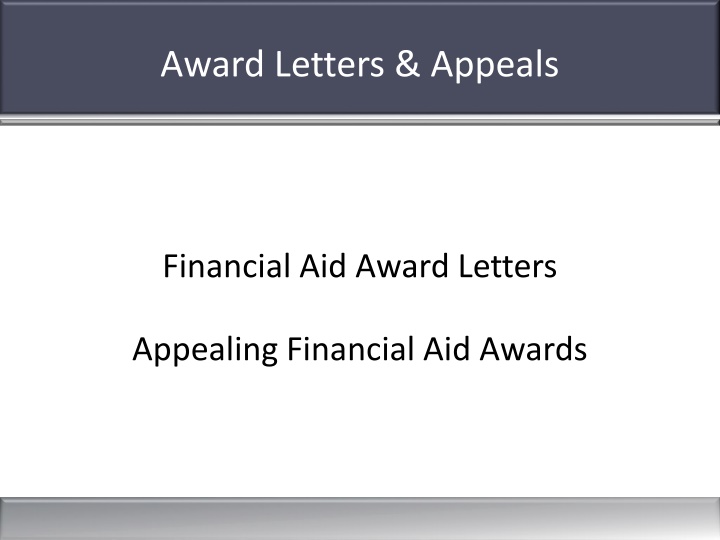
Financial Aid Award Letters and Appeals Process
Learn about financial aid award letters, how to appeal them, and understand the components to make informed decisions. Explore the appeals process, professional judgment, and special circumstances related to financial aid awards.
Download Presentation

Please find below an Image/Link to download the presentation.
The content on the website is provided AS IS for your information and personal use only. It may not be sold, licensed, or shared on other websites without obtaining consent from the author. If you encounter any issues during the download, it is possible that the publisher has removed the file from their server.
You are allowed to download the files provided on this website for personal or commercial use, subject to the condition that they are used lawfully. All files are the property of their respective owners.
The content on the website is provided AS IS for your information and personal use only. It may not be sold, licensed, or shared on other websites without obtaining consent from the author.
E N D
Presentation Transcript
Award Letters & Appeals Financial Aid Award Letters Appealing Financial Aid Awards
Award Letters The Award Letter: Understanding Financial Aid After Verification, each college will begin the process of issuing financial aid award letters to students around April of each year. Many high income families end up receiving grant money in the form of tuition discounts from small higher-priced private colleges.
Award Letters Award Letter Procedures: Understanding Financial Aid In order to even receive an award letter, the student must be accepted by that particular college. Students should apply to at least 4-8 colleges to insure their acceptance.
Award Letters Award Letter Procedures: Understanding Financial Aid Families should review each award letter to determine the net out-of-pocket cost of attending each school. You can appeal your award letter. Private schools have institutional grant money that can be negotiated.
Improving The Award Letter 1. Understand the Components The financial aid award letter varies in format from school to school 2. Compare Award Packages Be wary of how much of the award is actually loans 3. Respond to the Award Letter Don't delay in responding Accepting an award letter does not commit you to attend You can accept/reject any part of the award
Columbia University ---------Cost of Attendance----------- Tuition & fees: Room/Board: Travel: Other: Total: --------------Resources---------------- Parent Contribution: Student Contribution: $57,208 $13,618 $ 1,246 $ 2,101 $74,173 $2,000 $ -0- Total: $2,000 ----------------Summary---------------- Cost of Attendance: Total Resources: Total Awarded: $74,173 $ 2,000 $36,475 AWARDS Columbia University Grant Federal College Work Study Federal Pell Grant Federal FSEOG Direct Student Loan **TOTAL** TOTAL $25,000 $ 1,975 $ 2,500 $ 1,500 $ 5,500 $36, 475
Appealing Financial Aid Awards Understanding Financial Aid 1. The Appeals Process 2. Professional Judgment 3. Special Circumstances
The Appeals Process The student can appeal the award they receive Understanding Financial Aid from the college if it does not meet their financial needs. Each college has its own process for appeals and the student stands the best chance of receiving an improved award letter if they already have a better award in hand from another college.
The Appeals Process KEY POINTS: Understanding Financial Aid 1. Clearly state the reasons for the appeal 2. It is preferable to contact the financial aid officer in person 3. Request a specific amount of money 4. Submit any required documents to prove your case 5. Each college determines its own regulations for this process
Professional Judgment Professional Judgment is the authority given to Understanding Financial Aid the Financial Aid Officer to change the family s financial data in any way that would more accurately measure the family's ability to pay for educational costs. Professional Judgment can only be used if the family has special circumstances and Student Aid Report has been filed.
Special Circumstances Special circumstances are special conditions , Understanding Financial Aid such as divorce, separation, or the death of a parent or spouse that would change the family's ability to pay for educational costs.
Special Circumstances Some common special circumstances are: Understanding Financial Aid 1. Elementary/High School tuition costs 2. Excessive medical costs 3. Dislocated or unemployed worker 4. Divorce, separation or death of a parent 5. Federal natural disaster area 6. Unusually high child care costs 7. Unusual income or expenses (bonus) 8. Alumni or children of alumni 9. Cultural diversity 10. Match other college s awards
Special Circumstances KEY POINTS: Understanding Financial Aid 1. To attract the good students, private colleges will offer sizable tuition incentives in the form of discounts 2. Many private colleges that have declining enrollments will give "tuition discounts" to fill an empty seat. 3. When applying to a private college, the student should also apply to other competitive colleges. 4. The student can also request a college with a small award to match another college s higher award
Test Questions 1. In order to be to receive a financial aid award letter, the student must _____________ at that particular college. A. Have applied B. Be accepted C. Be enrolled D. None of the above 2. Colleges will begin the process of issuing financial aid award letters to students around ________ of each year. A. March B. April C. May D. None of the above 3. Many students from high income families receive award letters with grant money in the form of ______________ from small higher- priced private colleges. A. SEOG grants B. PELL grants C. Tuition discounts D. SMART grants 4. Families should review each award letter to determine the net out-of-pocket cost of attending each school. A. True B. False 5. Which statement about award letters is false? A. The financial aid award letter varies in format from school to school B. Much of the award can actually be loans, not free money C. Accepting an award letter commits you to attend the college D. You can accept/reject any part of the award
Test Questions 6. The student stands the best chance of appealing to a college to improve their award letter, if they already have a better award in hand from another college. A. True B. False 7. The process of appealing an award letter includes: A. Clearly state the reasons for the appeal B. Contact the financial aid officer in person C. Request a specific amount of money D. Submit any required documents to prove your case E. All the above F. None of the above 8. Professional Judgment is the authority given to the Financial Aid Officer to change the family s financial data to more accurately measure the family's ability to pay college costs. A. True B. False 9. Special circumstances are conditions, such as divorce, separation, or the death of a parent or spouse, that would change the family's ability to pay college costs A. True B. False 10. Some common special circumstances are: A. Excessive medical costs B. Unemployed worker C. Divorce, separation or death of a parent D. Natural disaster area E. All the above F. None of the above
Test Answers 1. B 2. B 3. C 4. A 5. C 6. A 7. E 8. A 9. A 10. E


